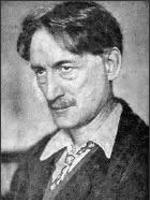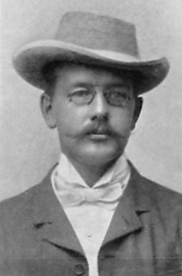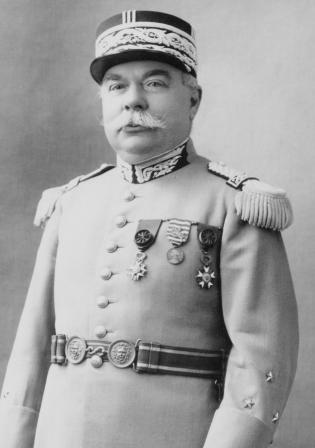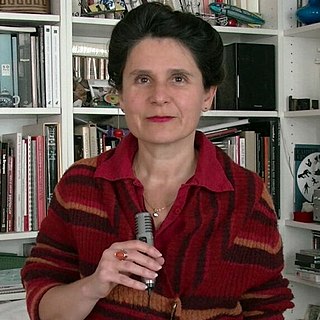
Marcelle Tiard (June 18, 1861 - June 1, 1932) was a French Esperantist.

Marcelle Tiard (June 18, 1861 - June 1, 1932) was a French Esperantist.
Marcelle Tiard was born on June 18, 1861 in Paris. [1]

She learned Esperanto in 1903, [1] before teaching it to the blind. [2] She is known to the Adresaro de la Esperantistoj under the number 11420. Tiard presided over the Esperanto group of Nice and the Federation of Provence. [3] She founded and presided over the Esperantist group of Algiers. [4] [5] In 1929, while in Budapest for the World Esperanto Congress, she co-founded the Unuiĝo de Esperantistaj Virinoj (Union of Esperantist Women) whose aim was to "sensitize women's, feminist and pacifist leagues to Esperanto". She was president of this union for some time [2] and provided moral and financial support. [6]
Marcelle Tiard died in Neuilly-sur-Seine, June 1, 1932. [7]

Esperanto is the world's most widely spoken constructed international auxiliary language. Created by the Warsaw-based ophthalmologist L. L. Zamenhof in 1887, it was intended to be a universal second language for international communication, or "the international language". Zamenhof first described the language in Dr. Esperanto's International Language, which he published under the pseudonym Doktoro Esperanto. Early adopters of the language liked the name Esperanto and soon used it to describe his language. The word esperanto translates into English as "one who hopes".

Henri Barbusse was a French novelist and a member of the French Communist Party. He was a lifelong friend of Albert Einstein.

Albert Auguste Gabriel Hanotaux, known as Gabriel Hanotaux was a French statesman and historian.

The Esperanto Wikipedia is the Esperanto version of Wikipedia, which was started on 11 May 2001, alongside the Basque Wikipedia. With over 331,000 articles as of February 2023, it is the 36th-largest Wikipedia as measured by the number of articles, and the largest Wikipedia in a constructed language.

Fundamento de Esperanto is a 1905 book by L. L. Zamenhof, in which the author explains the basic grammar rules and vocabulary that constitute the basis of the constructed language Esperanto. On August 9, 1905, it was made the only obligatory authority over the language by the Declaration of Boulogne at the first World Esperanto Congress. Much of the content of the book is a reproduction of content from Zamenhof's earlier works, particularly Unua Libro.
Knock is a 1923 French satirical play about modern medicine, written by Jules Romains. It was performed for the first time at the Théâtre des Champs-Élysées in Paris on 15 December 1923 in a production by Louis Jouvet. The play was presented with set designs by a young Orson Welles in Dublin in 1932, translated into and performed in Esperanto the same year, and also broadcast on TV by BBC Television as early as 1938.

Lidia Zamenhof was a Polish writer, publisher, translator and the youngest daughter of Klara (Silbernik) and L. L. Zamenhof, the creator of Esperanto. She was an active promoter of Esperanto as well as of Homaranismo, a form of religious humanism first defined by her father.

Hendrik Jan Bulthuis was a Dutch customs official, author, and translator of more than thirty works into Esperanto. One of his novels, Idoj de Orfeo is listed in William Auld's Basic Esperanto Reading List.

Valdemar Langlet was a Swedish publisher, and an early Esperantist. With his wife Nina Borovko-Langlet in Budapest, he is credited with saving many Jews from the Holocaust, by providing Swedish documents saying that people were waiting for Swedish nationality. Raoul Wallenberg was inspired by Langlet and used the same method to save Jewish people when he came to Budapest. In 1965, Valdemar and Nina Langlet were recognized as Righteous Among the Nations by Yad Vashem.

Louis Marie Jules Charles Bastien was a French Esperantist and a quartermaster in the French army. In 1899 he married Marguerite Pfulb (1879–1941); the couple had three daughters and two sons. In school he learned mathematics, classical French literature, Latin and Greek and learned to compose Latin verse. After a year of preparatory studies at l'Ecole Sainte-Geneviève in Versailles he entered l'Ecole Polytechnique in 1887 at the age of 17. Not having the maturity of his older classmates, he did not excel in his studies and, on graduation in 1889, had to content himself with a military career.

Louis-Christophe Zaleski-Zamenhof was a Polish-born French civil and marine engineer, specializing in the design of structural steel and concrete construction. He was a grandson of the Polish Jewish L. L. Zamenhof, the inventor of the international auxiliary language Esperanto. From the 1960s until his death, Zaleski-Zamenhof lived in France.

Petro Evstaf'evic Stojan was a Ukrainian esperantist, bibliographer and lexicographer and a member of the Esperanto Language Committee from 1914.
Ferdinand Jean Marie Valentin Duviard was a French high school teacher in Cahors, a writer and novelist. He became an Esperantist in 1905, wrote for many publications and was active in Esperanto youth groups. With Charles Pichon he co-founded Francan Federacion de Junaj Esperantistoj.

The World Esperantist Vegetarian Association is a voluntary association of Esperanto-speaking vegetarians. Founded in 1908, the group's working language is Esperanto, and it is the oldest international organization of vegetarians that is currently active. TEVA published a journal, Vegetarano ("Vegetarian") from 1914 to 1932, revived in 2009 as Esperantista Vegetarano, and has also operated a spirited Internet mailing list through Yahoo! Groups since 2005.

Jeanne-Henriette Tirman was a French woman painter and printmaker.

The Esperanto workers movement has the goal of taking practical advantage of the international language Esperanto for advancing the goals of the labour movement, especially the fight against unrestrained capitalism. It is not only a political movement in the strict sense but also a cultural and educational one. Currently the principal Esperanto associations active in the Esperanto workers movement at the global level are the Sennacieca Asocio Tutmonda and the Internacia Komunista Esperantista Kolektivo, and in a wider sense, the Monda Asembleo Socia.

Marie Sophie Jeanne Laisné was a French operatic soprano with the Opéra-Comique. She started her career as Sophie in the first French production of Massenet's Werther, and went on to create the roles of Aurore in Jules Massenet's Le portrait de Manon, Jeanne in Benjamin Godard's La Vivandière, La Duchesse de Fronsac in Henri Hirschmann's L'amour à la Bastille, and Henriette in Ernest Lefèvre-Dérodé's Le follet. Other notable roles include Micaela in Bizet's Carmen and as Mimi in Puccini's La bohème.

La Voix des femmes was a "political, social, scientific, artistic" weekly newspaper, founded in 1917 by Colette Reynaud and Louise Bodin, the first issue of which was published on October 31, 1917. The newspaper, which proclaimed itself in 1919 as "feminist, pacifist, socialist and internationalist", appeared until 1937.

Sophie Wahnich is a French historian. She is director of research at the French National Centre for Scientific Research (CNRS) and a specialist in the French Revolution.